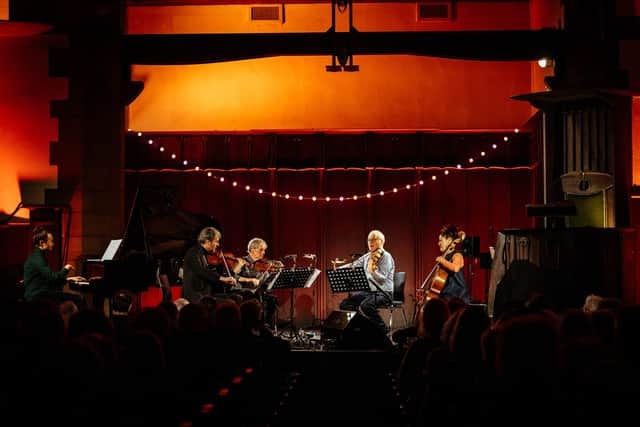Celtic Connections review: Fergus McCreadie with Maeve Gilchrist & Mr McFall's String Quartet, The Mackintosh Church, Glasgow
Fergus McCreadie with Maeve Gilchrist & Mr McFall’s String Quartet, Mackintosh Church, Glasgow ****
Jazz pianist Fergus McCreadie is (young) man of the moment following his Scottish Album of the Year Award win for Forest Floor, on which he further refined the folk infusions of his immersive music. His Celtic Connections collaborators Mr McFall’s String Quartet – older as an ensemble than McCreadie, noted founder Robert McFall – have form with cross-genre partnerships and, on this outing, opened up the timeless, classical elements of three McCreadie album tracks, enhancing the themes of nature and landscape for which McCreadie is known.
Advertisement
Hide AdAdvertisement
Hide AdAn opening light drone gave way to a wan melody gradually picked out on violin and piano, evocative of the pale light of dawn and flora and fauna gradually coming to life. Soon the natural order was spiced up with a touch of dissonance and chirruping personality as blithe pizzicato strings were teamed with McCreadie’s hypnotic patterns.


This, it transpired, was the bonus additional material arranged when McCreadie realised his central performance fell short of his allotted time. His 2022 Dandelion Festival commission from Celtic Connections director Donald Shaw was concise but perfectly formed, inspired by and redolent of the life cycle of a plant from germination to pollination, with impish scurrying strings giving way to melodramatic piano and on to the playful, gambolling opening of the fourth and final movement.
Earlier in the evening, the opening moments of Edinburgh-born, US-based harpist Maeve Gilchrist’s collaboration with McFall’s, inspired by Edna St Vincent Millay’s poem The Ballad of the Harp Weaver, were slightly marred by feedback and an indistinct playback of a recording of Millay, but the music was an undulating delight, soaring and exultant with a clear strain of Celtic romanticism in the string arrangements.
McCreadie and Gilchrist later encored together, playing mesmeric unison and complementary melodies, before a final dark, dramatic solo encore from McCreadie.